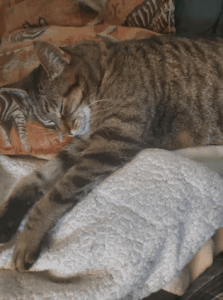There are many signs of dental disease such as tartar, gingivitis, bleeding, not eating. Sometimes your veterinarian can see a tooth that’s loose or that the enamel is damaged. The tricky part is that teeth are like little icebergs and much of the tooth is below the gum line. This is where dental radiographs come in very handy.
A true story from our hospital: Brayden is a 14-year-old domestic short-hair cat. His owner noticed that sometimes he would paw at his mouth, so he suspected that there was something wrong with Brayden’s teeth. Brayden being a well behaved lil guy let the veterinarian do a rather good visual check of his teeth. Aside from a small amount of tartar on a couple of teeth, there were no signs of a deeper infection or disease. Brayden’s owner opted to go ahead with a dental procedure including radiographs, just to reverse the infection that was present (plaque and tartar). All involved were expecting a routine procedure. When the radiographs were complete they revealed that ALL four canines and 2 molars were affected by resorptive lesions at the roots. This means the roots were disintegrating and resorbing into the jaw below the gum line and this can be quite painful. The affected teeth were removed and Brayden is much happier now that he is pain-free. He still much enjoys his kibble.
If radiographs had not been done Brayden would still be dealing with the painful dental disease and they likely would have fractured once there was no longer enough root to anchor them.
Dental radiographs can also find root abnormalities, unerupted teeth, bone loss, underlying infection or abscesses. Ideally, full mouth radiographs should be done with every dental procedure. Depending on your pet, that might be every 1-3 years.
Below is one of Brady’s radiographs and him happily snoozing at home afterwards.


By Melanie G RVT